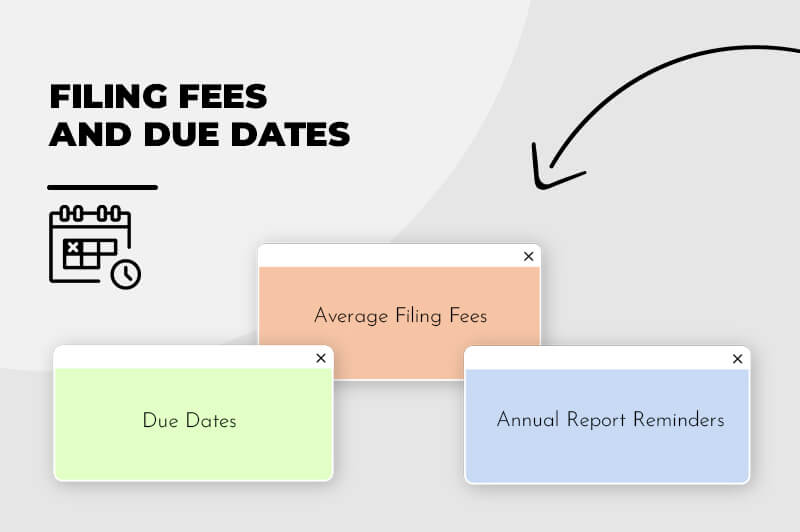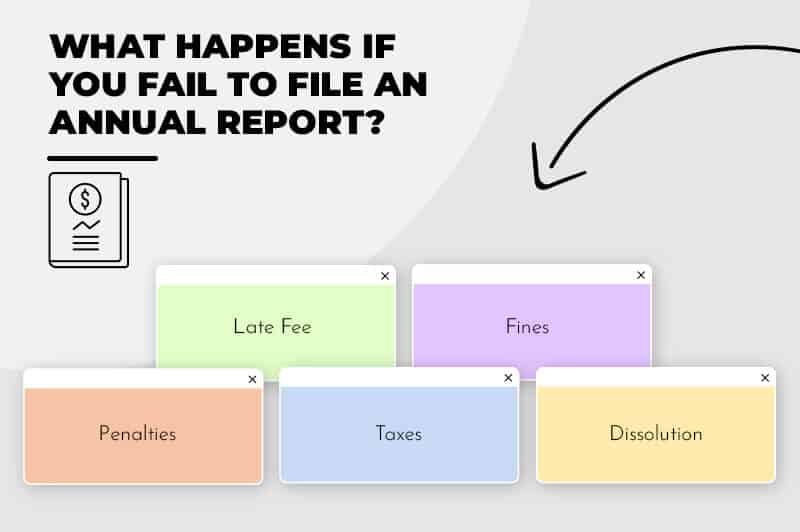
You gain many benefits when registering an LLC, but with those perks come responsibilities, such as filing an annual report.
Annual reports are document-style business information updates that LLCs must submit to their Secretary of State. These reports contain a range of information that you must file by a specific date, both of which you must get right to maintain good standing with your state.
And good standing is imperative to your LLC’s success because you could lose your business without it.
An annual report is a document that details your LLC’s general information and changes over the previous year.
The information you provide in your LLC annual report helps your state determine the current status of your business and if the business is trading according to state requirements.
An annual report’s primary purpose is to provide specific business data to your governing state authorities and publicly disclose your LLC’s information and conditions over the past year.
Your LLC annual report also provides details regarding the current owners, business set-up information, and any changes since the last filing date.
Depending on location, annual reports go by different names, including “statement of information” or a “periodic report.”
Annual reports give your state the most up-to-date information about your business and any changes since the last filing period.
These details include:

Most states require you to file a report yearly. However, some have biennial report filing dates (every 2nd year), others less frequently, like Pennsylvania, where you submit every 10 years. And some states, like Missouri, don’t require you to file an annual report.
It’s important to note that the filing requirements, whether it’s an annual report, there’s no requirement at all, or a biennial report may change over time and it’s crucial to maintain annual compliance with the state and remain in good standing. Be sure to receive updates from the state in case the requirement will change.
Filing fees and due dates vary depending on the entity type (including an LLC, corporation, and limited partnership) and whether they’re domestic or foreign to a state.
Filing your annual report ensures your business remains compliant with all state government regulations, which helps preserve your flow-through tax status and limited liability protection.
LLC annual report filing fees range from $10 to $500, depending on your state.
Report due dates also vary depending on your state of registration.
Some states implement a predetermined date for all business entities to file their reports. In contrast, others make you file it within 30 or 60 business days of your formation date.
Certain states send you annual report reminder forms to help you meet your deadline.
You can decline to receive an annual report reminder or opt to continue receiving it yearly.
When you choose to receive it, your state will email your reminder only if your business doesn’t have any outstanding annual reports and your company email address is on their file. Otherwise, they’ll send you a reminder by mail.
But if your state doesn’t send an annual report reminder, you can outsource to an annual report filing service, like the one here at Tailor brands.

Annual reports often feel like a formality, resulting in some businesses forgetting to file. But not filing on time (or at all) is a severe offense that comes with consequences.
When you fail to file your annual report on time, states can impose late filing fees and penalties that you must pay on top of your regular filing fee.
Filing fees vary; for example, in Florida, the late filing fee is $400. North Carolina doesn’t charge a late filing fee penalty, but instead, you’ll receive a “Notice for Grounds for Administrative Dissolution” if you don’t file your report.
Not filing can result in losing your business’s “good standing” with your state. Losing your good standing can compromise your business activities; it’s often impossible to open a business bank account without it.
To gain your good standing back, you must file a reinstatement form, submit your outstanding annual report, and pay the late filing fines and an extra fee.
Many states also make you pay other business taxes that could coincide with filing your LLC annual reports, such as franchise tax and sales and use tax.
If you fail to file by a specific date, your state will dissolve your LLC and remove it from their register, losing your limited liability protection and possibly your business name.
Once you’ve completed your annual report form, you must submit it to your state along with the filing fee.
Almost all states allow you to file your LLC annual report online using their Secretary of State’s website. But some still require you to use a paper filing system that you then mail to the appropriate office.
Before you file, check with your Secretary of State’s website for details. Or remove the hassle and use our compliance and annual report filing service.
If you’ve registered as a foreign LLC in other states, you might have to file an annual report where you’re doing business.
Check with each state you’re operating in to confirm their filing dates, fees, and requirements.

Staying on top of filing reports and meeting deadlines can be an unwanted frustration for many new business owners. And finding your state’s specific details on a complicated government website often compounds the feeling.
To remove the frustration and make your life a little easier, we’ve compiled a list of annual report filings costs and dates (state by state).
State | Filing Fee | Due Date |
No Annual Report is Required (basic information is needed as part of a business tax return filing) | – | |
100$ | Biennial Report – on January 2nd | |
No Annual Report is Required. | – | |
150$ + 5$ Online fee | Annually by May 1st | |
20$ | Biennially by your registration anniversary. | |
10$ | Annually by your registration anniversary. | |
80$ | Annually by March 31st | |
Annual tax of 300$ (No annual report requirement) | Annually by June 1st | |
300$ | First report is due on April 1st after registration. After the first filing, Biennial reports by April 1st | |
138.75$ | Annually by May 1st | |
50$ | Annually by April 1st | |
15$ | Annually by your registration anniversary. | |
0$ | Annually by the last day of the anniversary registration. | |
75$ | Annually by the last day of the anniversary registration. | |
32$ | Biennially by the last day of the anniversary registration. | |
60$ | Biennial report by April 1st | |
55$ | Annually by April 15th | |
15$ | Annually by June 30th | |
30$ | Annually by your registration anniversary. | |
85$ | Annually by June 1st | |
300$ | Annually by April 15th | |
500$ | Annually by your registration anniversary. | |
25$ | Annually by February 15th | |
0$ | Annually by December 31st | |
0$ | Annually by April 15th | |
No Annual Report is Required. | – | |
20$ | Annually by April 15th | |
10$ | Biennial by April 1st | |
150$ | Annually by your registration anniversary. | |
100$ | Annually by April 1st | |
75$ | Annually by your registration anniversary. | |
No Annual Report is Required. | – | |
9$ | Biennially by your registration anniversary. | |
203$ | Annually by April 15th | |
50$ | Annually by November 15th | |
No Annual Report is Required. | – | |
25$ | Annually by your registration anniversary. | |
100$ | Annually by your registration anniversary. | |
70$ | Decennial report by December 31st | |
50$ | Annually by May 1st | |
No Annual Report is Required (unless elected S-Corp taxation) | – | |
50$ | Annually by your registration anniversary. | |
300$ + 50$ per member | Annually by April 1st | |
0$ | Annually by May 15th | |
20$ | Annually by your initial registration date. | |
35$ | Annually by March 31st | |
50$ | Annually by your registration anniversary. | |
60$ | Annually by your registration anniversary. | |
25$ | Annually by July 1st | |
25$ | Annually by your registration anniversary. | |
60$ | Annually by your registration anniversary. |
Filing accurate annual reports on time is crucial for maintaining good standing with your state and protecting you and your LLC.
When you form your LLC, check all state report compliances and provide your contact details so they can remind you of your due filing date.
Keep in mind that even if you don’t receive a reminder, it’s your responsibility to submit your LLC annual report on time.
So, ensure you avoid late date fees by using a due date calendar reminder for all your reports.
This portion of our website is for informational or educational purposes only. Tailor Brands is not a law firm, and the information on this website does not constitute legal advice. All statements, opinions, recommendations, and conclusions are solely the expression of the author and provided on an as-is basis. Accordingly, Tailor Brands is not responsible for the information and/or its accuracy or completeness. It also does not indicate any affiliation between Tailor Brands and any other brands, services or logos on this page.
Products
Resources
©2025 Copyright Tailor Brands